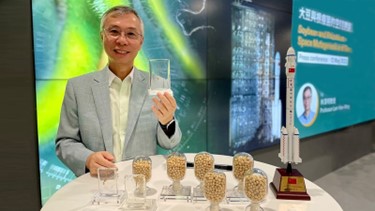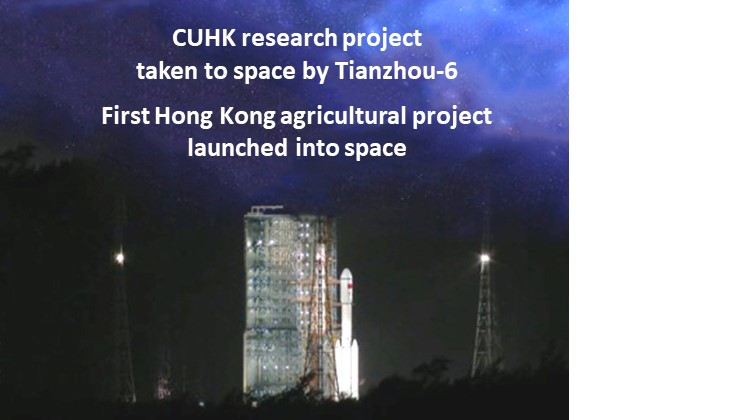Space-bound soybeans pave the way for breakthroughs in climate-resilient farming

Sponsored by

Sponsored by

Prof. Hon Ming Lam advances soybean breeding through integration of aerospace and agricultural technology.
Researchers from CUHK have achieved a significant milestone in agricultural research by sending soybean seeds into space. The ambitious experiment aims to discover how soybean seeds and nitrogen-fixing bacteria mutate in space conditions, opening the door to new advances in agricultural technology that could make soybean farming more resilient to climate change.
Three types of soybean seed have been launched into space aboard the Shenzhou-16 crewed spacecraft, while specimens of a bacteria known as rhizobia, which helps soybean plants absorb essential nutrients from the air, are on the Tianzhou-6 cargo spacecraft bound for Tiangong space station. The project is led by Prof. Hon Ming Lam, Choh-Ming Li Professor of Life Sciences and Director of the State Key Laboratory of Agrobiotechnology at CUHK.
Soybeans for a sustainable future
The soybean seeds chosen for the experiment are known for their high tolerance to salt and drought: qualities which can help our food supply become more climate-resilient. Prof. Lam’s team will analyse the specimens on their return to explore how their mutation mechanisms behave in space, with the aim of achieving breakthroughs in agricultural technology and identifying new soybean seed materials with promising applications for farmers.
Rhizobia bacteria, meanwhile, interacts with the roots of soybean plants to convert nitrogen found in the air into a form of natural fertiliser. By studying how rhizobia mutate in space, the team aims to identify new bacterial strains that can convert nitrogen more efficiently and have higher tolerance for salt, heat and drought. Eventually, this could dramatically reduce the use of chemical fertilisers, which account for major greenhouse gas emissions from crop production, representing a vital step forward for climate-friendly farming.
Bringing benefit to the world’s most disadvantaged
Soybeans have the potential to play a vital role in the future of global agriculture. They are highly nutritious and an excellent source of protein, meaning that they can contribute to food security in regions where meat consumption is limited due to economic factors.

Three types of stress-resistant soybean seed have been taken to space by the Shenzhou-16 crewed spacecraft.
The three stress-resistant seed varieties sent into space were originally developed by Prof. Lam and his colleague Prof. Guohong Zhang from the Gansu Academy of Agricultural Sciences. Since 2016, these seeds have been distributed at no cost to local farmers in Gansu province in China to help them increase yields in harsh climatic conditions. In addition, Prof. Lam has subsidised farmers in a drought-stricken village in South Africa to cultivate drought-tolerant soybean and other crops, and started a project in Pakistan to test the heat tolerance of his soybean cultivars while helping local women acquire agricultural knowledge that may improve their social status.
The space experiment is supported by the China Manned Space Agency, China Resources Research Institute of Science and Technology and Shenzhou Space Biotechnology Group.
Prof. Lam said, ‘This project, on the one hand, marks a new milestone for agricultural advancement in Hong Kong, and on the other hand, it also strengthens the synergistic scientific efforts in Hong Kong and mainland China. I hope that this project can also inspire local students to excel, to break through, and to broaden their horizons.’
Watch the video to witness CUHK soybean research project taken to space!

Read more:
- CUHK soybean taken into space by Shenzhou-16—The second part of the first Hong Kong agricultural space research project launched
- The soybean voyage
(May 2023)